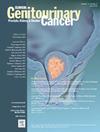Very Early Relapse (< 1 year) in de novo Metastatic Seminoma is Associated With Reduced Overall Survival
IF 2.7
3区 医学
Q3 ONCOLOGY
引用次数: 0
Abstract
Introduction
As the characteristics and outcome associated with relapse in seminomatous testicular germ cell tumors (STGCT) are still unclear, this study aims at evaluating the differences between very early relapse (VER) and later relapse (LR) in this cohort of patients.
Material and methods
This retrospective analysis included 459 patients with STGCT treated from 2000 to 2024, analysing patient characteristics with nonparametric statistics as well as follow-up using Kaplan Meier analyses. VER was defined as tumour recurrence < 12 months after successful treatment.
Results and limitations
About 94 (20%) patients relapsed during a median follow-up of 19 months [IQR 2-68]. De novo metastatic patients with VER (n = 38, 40%) showed a significantly higher number of clinical stages 2C-3 disease (21% vs. 4%, P = .007), M-stage (P = .009) at diagnosis as well as a higher HCG level (P = .030) and LDH levels (P < .001; >2x ULN P = .039) at start of chemotherapy compared to patients with LR (n = 56; 60%). Initial treatment did not significantly differ between VER and LR (P = .199). VER after initial metastatic disease was associated with a significantly reduced overall survival compared to LR (P = .046), however not after de novo stage I. Our study is limited by its retrospective design.
Conclusion
Relapse in seminoma occurred in 20% of all patients. In the initial metastatic stage, VER was associated with a higher metastatic burden at diagnosis compared to LR, leading to a reduced overall survival in VER. Consequently, treating physicians should be aware of these patients portending a worse prognosis, potentially discussing an early intensification of systemic treatment.
新发转移性精原细胞瘤的早期复发(< 1年)与总生存率降低相关
由于与半瘤性睾丸生殖细胞肿瘤(STGCT)复发相关的特征和预后尚不清楚,本研究旨在评估该队列患者早期复发(VER)和晚期复发(LR)之间的差异。材料与方法回顾性分析2000 - 2024年间459例STGCT患者,采用非参数统计分析患者特征,并采用Kaplan Meier分析随访。VER定义为肿瘤复发<;治疗成功后12个月。结果和局限性约94例(20%)患者在中位随访19个月期间复发[IQR 2-68]。新发转移性VER患者(n = 38, 40%)在诊断时临床分期为2C-3期(21% vs. 4%, P = 0.007)、m期(P = 0.009)以及HCG水平(P = 0.030)和LDH水平(P <;措施;与LR患者(n = 56;60%)。初始治疗在VER和LR之间无显著差异(P = 0.199)。与LR相比,初始转移性疾病后的VER与总生存率显著降低相关(P = 0.046),但与新发i期无关。我们的研究受到回顾性设计的限制。结论精原细胞瘤复发率为20%。在初始转移阶段,与LR相比,VER在诊断时具有更高的转移负担,导致VER的总生存率降低。因此,治疗医生应该意识到这些患者预示着更糟糕的预后,潜在地讨论早期加强全身治疗。
本文章由计算机程序翻译,如有差异,请以英文原文为准。
求助全文
约1分钟内获得全文
求助全文
来源期刊

Clinical genitourinary cancer
医学-泌尿学与肾脏学
CiteScore
5.20
自引率
6.20%
发文量
201
审稿时长
54 days
期刊介绍:
Clinical Genitourinary Cancer is a peer-reviewed journal that publishes original articles describing various aspects of clinical and translational research in genitourinary cancers. Clinical Genitourinary Cancer is devoted to articles on detection, diagnosis, prevention, and treatment of genitourinary cancers. The main emphasis is on recent scientific developments in all areas related to genitourinary malignancies. Specific areas of interest include clinical research and mechanistic approaches; drug sensitivity and resistance; gene and antisense therapy; pathology, markers, and prognostic indicators; chemoprevention strategies; multimodality therapy; and integration of various approaches.
 求助内容:
求助内容: 应助结果提醒方式:
应助结果提醒方式:


